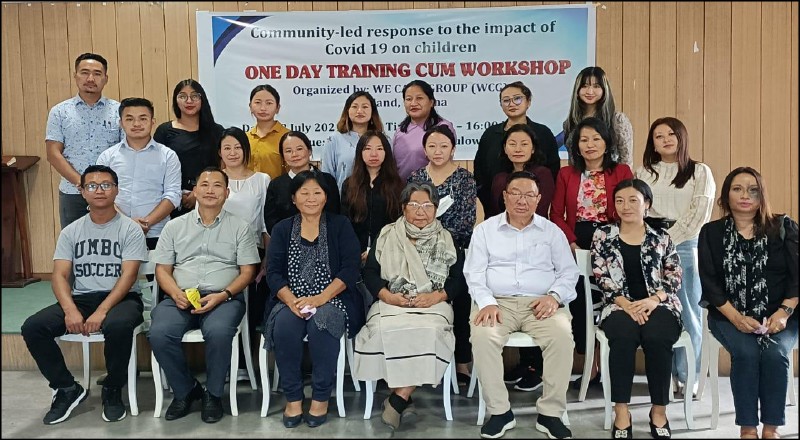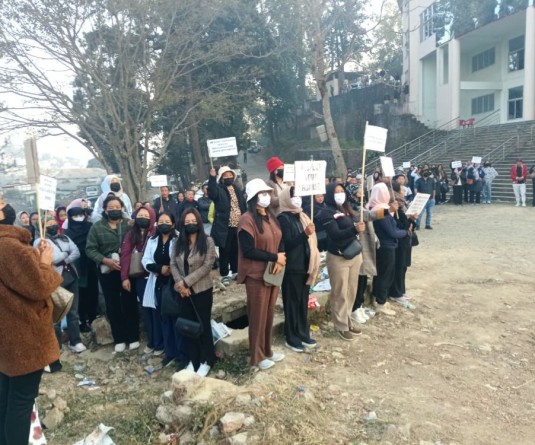Participants of the training workshop that was organised by the We Care Group on July 23. (Photo Courtesy: WCG)

Dimapur, August 1 (MExN): A training and workshop programme to address the impact of COVID-19 on children and the need to community-led response to tackle the situation took place in Kohima on July 23.
On Sunday, the organisers— We Care Group (WCG) issued a report on the workshop underscoring how community-led programmes, with support from professionals, church, schools, and government can tackle the problem and ensure that the children in the Naga community are protected from any further trauma.
The founding members of the We Care Group include Neidonuo Angami; Alemtemshi Jamir, IAS (Retd); Pheluopfhelie Kesiezie, Educationist; Dr P Ngullie, Consultant Psychiatrist and Neichute Duolo, social entrepreneur.
As per the report, the workshop began with opening remarks from Pheluopfhelie Kesiezie, an educationist and Administrator of Northfield Higher Secondary School, Kohima. With the primary focus on the education system, Kesiezie noted how academic education became ‘non essential’ in the past year during the COVID-19 induced lockdowns.
However, as the lockdowns were eased, we realized that the education system needs to be compassionate and humanitarian, he said. He pointed out that learning Math, Science, and Geography is not the most important aspect of education but other forms of ‘higher learning’ such as love, compassion, respect and truthfulness should be taught.
Neidonuo Angami enlightened the gathering about how the group was initiated and why it was indispensible for the Naga community to address the impact of COVID-19 on children. By garnering help from the social and spiritual safety networks that the Naga society provides, and with the help of professional psychologists and counsellors, she emphasized that society could create a safe space for traumatized children. Stating that the future of the community would be affected if the traumatic experiences faced by children during this pandemic are not tended to, she urged the gathering to give heed to the idea of a community-led programme that would factor in support from civil and governmental agencies, to address the issue.
Psychological Perspective
Laying out the perspective of psychological impacts of COVID-19 on children, Dr P Ngullie elaborated on the human nature of thoughts, and how thoughts work inside the human mind. He emphasised on the importance of recognizing the consequences that thoughts can have on the functioning of the human body and based his talk on three broad topics—psychological impact, response to the psychological impact and intervention on the psychological impact.
Dr Ngullie underlined that manifestation of common emotional impacts like fear, anxiety, restlessness, apathy, among others, are not particularly shown through emotions in children. As an example, he said that fear can manifest in myriad different ways, and its impacts can resurface later on in life. He said that the child’s psychological balance and ability to develop these wired programs in the brain depend on the emotional environment and atmosphere at home and stated that emotional and physical support, moral values taught at home, schools, society, etc., all determine how the child’s program of empathy is triggered healthily.
As such, he emphasised on the role of the parent and underscored that the fears of the child should be discussed and not dismissed, in order for them, to undergo a proper process of healing and avoid psychological manifestations in the future.
Dr Ngullie also spoke on how dependence on medication to alleviate anxiety, stress, and worry can lead to abuse and highlighted the importance of self-consciousness or professional intervention to avoid falling into this dependence. A discussion on depression, self-blame, and suicide was also made, the report stated.
Physical manifestations of common physical impacts such as changes in sleep patterns, eating disorders, increased muscle tension and pain, bowel disturbances, development of regression in children were also discussed during Dr Ngullie’s session, according to the report. Along with it, common cognitive impacts like difficulty in concentration, making decisions and problem solving, poor memory, self-destructive thoughts, increased creative expression through music, writing, art, etc., in children as well as adults as a result of trauma were also deliberated upon.
“Children can also be vulnerable victims to self-destructive thoughts of family members in the home and domestic abuse,” Dr Ngullie said while emphasising on the need to create this awareness.
Further elaborating on common social impacts, Dr Ngullie underlined that the quarantine has deprived people of physical social interaction, which could lead to different emotional impacts psychologically. Noting that there is also a tremendous fear of ‘change,’ he said that doubt, fear, and hesitance in the ‘new normal’ causes stress, distress, and anxiety even for simple things like whether one should receive parcel deliveries with or without gloves, and whether they should disinfect the entire package before letting it enter the house. These kinds of small daily dilemmas can hamper the emotional balance of the individual, he added.
Further noting that the pandemic situation has disrupted the proper process of communal grieving that is integral to Naga tradition, Dr Ngullie said that the impact could be damaging because the bereaved may continue grieving (even unconsciously). The child especially faces these consequences because they are not allowed to properly make peace with the sudden departure of their loved one and the trauma of this loss might affect the children for the rest of their lives and manifest in different psychological problems. The fear and loss of the child should not be suppressed and should be provided with ample emotional and physical support, he added.
To deal with these impacts, Dr Ngullie asserted that the society has start looking together for practical, pragmatic support, and this should be provided in an empathetic manner. “Collaborative approaches can prove to be valuable and constructive. There should be an awareness of key signs of emotional distress so that quick interventions can be made,” he said.
He also said that over-medication should be prevented as it cannot bring healing to psychological distress and only acceptance and reconstitution of thinking can help the individual heal. “Treatments should be offered for psychiatric disorders because these are the people that are most vulnerable to the effects of the pandemic,” he maintained.
Spiritual Perspective
Presenting the spiritual perspective, Director of Generation Ministries Menuo Keditsu said that one has to be increasingly participatory and creative when working with children. Stressing on the importance for children to grow and develop intellectually, physically, spiritually, and socially, she highlighted some of the deprivations that children have been facing due to the pandemic such as the disruption in daily living activities and social bonding, celebrations of milestones in their lives, interactive learning through physical school education, spiritual input through the Churches’ Sunday school, etc.
These deprivations, she said, could result in adverse personality changes and frustrations, significant setbacks in their learning, inadvertent dependency on technological gadgets, as well as vulnerable exposure to domestic violence and exploitive substitutes, among many others.
Drawing parallels between the present pandemic scenario and examples of upheavals in the lives of young people in the Bible, Keditsu conducted a group discussion session which presented various ways in which church ministries and its functionaries can minister to children and help deal with their trauma in the process.
Some of the suggestions included encouraging parents to play the teacher role at home, send pre-recorded messages to children through WhatsApp, giving little gifts to children (like bookmarks) to let them know that they are remembered in prayers, sending packages to family in need, giving emotional support through the phone, creating a helpline for people to call when in distress and need of emotional support, creating a YouTube channel for providing prayers and messages, etc.
She also emphasised on the need to talk about the pandemic with children, giving them control and letting them know of what they can do to help themselves, helping them deal with grief and loss over deaths and distressing changes by way of giving them space and time to express themselves.
In conclusion, she stressed upon the importance of bringing up young children in the light of God, and the need to let children learn the love of God for them to grow resilience.
Further, the report stated that discussions on how the We Care Group can test out its model initiative and how the participants would put to practice the knowledge they gained from the talks were also held during the session.
It said that the group also decided to hold a memorial service for the ones who have lost their loved ones and also initiate clubs in schools called ‘We Care Club’, which will be a subgroup of the We Care Group.
In conclusion, Neichute Doulo highlighted the relevance of the Naga culture in helping to tackle the problems faced during the pandemic and provided allegories for how 'care' and 'love' for people are ingrained in the Nagas and that those are the characteristics that make Nagas different from the other states of India. He also thanked the gathering for taking their time to be present in the training workshop and urged them to help in disseminating the knowledge they gathered and practice what they have learned.
Altogether, 29 persons comprising schools and churches (Sunday schools teachers) in Kohima attended the programme, the report stated. The rapporteurs for the event were Childline Kohima and Entrepreneurs Associates.






